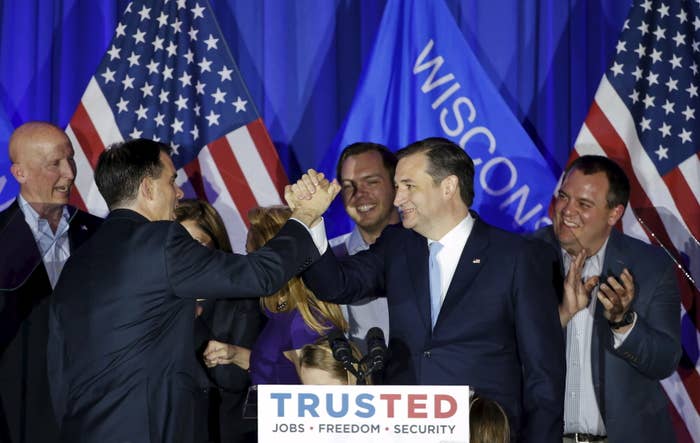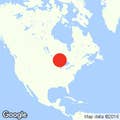
MILWAUKEE — Ted Cruz declared his victory in Wisconsin a turning point in the race on Tuesday.
Both Donald Trump and Cruz kept a busy slate of events in the days leading up to the primary, and Cruz deployed a fleet of endorsers who did events on their own with his wife, Heidi. Trump, appearing to sense the need to put in extra work in a state where he was behind, even reportedly skipped his grandson’s bris to continue campaigning here after spending a full week off the campaign trail before that.
Cruz’s win here will hand him the lion’s share of Wisconsin’s 42 delegates and further dent Trump’s winning image. But the high could be short-lived. The next primary is in New York, Trump’s home state, where he is expected to dominate and which yields 95 delegates. Cruz slowed Trump, and made a contested convention more likely, but he didn’t stop him.
After the race was called, Cruz spoke to a couple hundred supporters gathered inside the American Serb Hall here (a venue that makes a cameo in Hunter S. Thompson’s account of the 1972 election as the site of a George Wallace speech).
Cruz used the opportunity to try and mark Wisconsin as the beginning of the end of Trump and redefine himself as a broadly appealing general election candidate.
“Tonight is a turning point,” Cruz said. “It is a rallying cry."
Cruz emphasized that the “full spectrum” of the Republican Party is uniting behind him, citing establishment endorsers like Jeb Bush and Lindsey Graham, and made an appeal to women, drawing a contrast with Trump, who is broadly unpopular among women: “Strong women can accomplish anything in the United States of America,” Cruz said, citing his mother and wife.
“Hillary, get ready, here we come,” Cruz finished.
Cruz benefited, as he has throughout the primary, from a disciplined organization and key endorsements, including Wisconsin governor Scott Walker, who ended his own presidential bid relatively early on in the process. And Trump stumbled badly over the past week, changing his position on abortion five times in three days and giving embarrassingly uninformed interviews, all coming on the heels of his campaign manager being charged with simple battery in Florida. The anti-Trump movement was more coordinated than ever before in Wisconsin, with forces like Our Principles PAC spending $2 million on advertising and making 1 million voter contacts, the PAC said in an email sent to reporters.
Cruz dealt with his own obstacles in the days leading up to the primary, including the continued presence of John Kasich, whom Cruz plainly views as an irritant blocking his path to a solo fight against Trump. Before March 15, Kasich wasn’t much on Cruz’s radar. But the Cruz team has increasingly turned its firepower on Kasich, running ads and putting out mailers to try to get him out of the way.
“I’m assuming he’s auditioning to be Donald Trump’s vice president,” Cruz communications adviser Jason Miller told reporters at Cruz’s election night party in Milwaukee. “I’m sure Dennis Rodman and Omarosa and Gary Busey are gonna be real distressed to learn they have competition. That’s really all that it can be. A rational person can’t look at the John Kasich candidacy and have any understanding of why he’s continuing in this race unless he’s trying to help Donald Trump.”
The specter of a possible contested convention is looming larger and larger over the primary. Cruz increasingly acknowledges that his path to the nomination may involve a convention floor battle if no one reaches 1,237 delegates by the end of the voting process.
Pressed on whether the campaign now acknowledges that as the more likely scenario, Miller hedged, saying, “We’re trying to win the nomination, you can do that two ways,” and “There are a number of scenarios by which we can get to 1237.”
During his speech, Cruz said, “I am more and more convinced that our campaign is going to earn the 1,237 delegates" necessary for the nomination, but added that it would be "either before Cleveland or at the convention in Cleveland."
The race will now turn east to New York, and then states like Connecticut and Delaware that are not natural territory for Cruz. He is campaigning on Wednesday in the Bronx and the day after in upstate New York.

